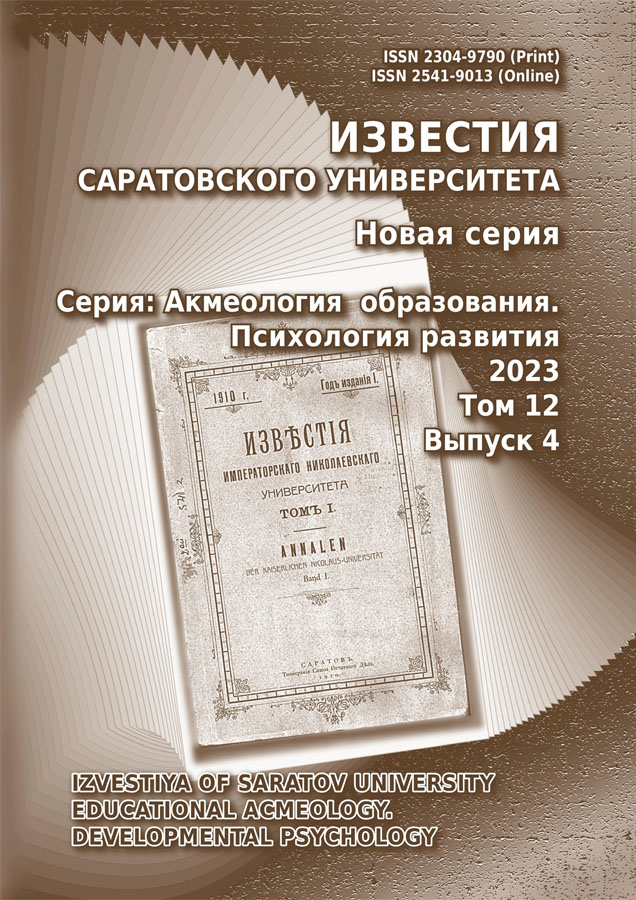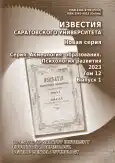Vol 12, No 1 (2023)
Articles
Everyday life of high school students at university lyceum and gymnasium: Outcomes of comparative research
Abstract
 4-16
4-16


Research and design university campus as an effective environment for the development of a student-innovator
Abstract
 17-23
17-23


Interpersonal rejection as a special type of relationship in the ontological constant ‘Me and the Other’
Abstract
 24-33
24-33


Subjective well-being in its relation to various forms of activity of the student youth
Abstract
Social activity is the sphere of students’ personal socialization and fulfi llment. The study of interconnection between adherence to various forms of social activity and characteristics of subjective well-being allows unveiling the most general parameters of student activity’s consistence and personal orientation. The purpose of the study is to carry our analysis of the interconnection between subjective well-being characteristics and social activity forms. It is assumed that various forms of activity have the potential for satisfying students’ psychological needs and creating a balance between the desired and the real situation. Participants. 215 university students of Russia (aged from 17 to 27; the mean age was М = 20,2; SD = 2.44 (42.3% males). Measurements.The following techniques were used: questionnaire for defi ning major demographic characteristics and adherence to various forms of activity that were classifi ed as follows: civil-political, protest-subcultural, spiritual-educational, and leisure activity, to defi ne subjective well-being characteristics we used the Basic Needs Satisfaction in General Scale (M. M. Johnston, S. Finney); Subjective well-being scale (S. Lyubomirsky, H. Lepper); Life satisfaction scale (E. Diener); Social frustration technique (L. I. Wasserman). Results. The cognitive component of subjective well-being in students is coupled with their desire for civil and political participation, volunteerism, potential development, and education. Emotional component is positively correlated with implementation of spiritual search, educational activity, self-development; it is negatively correlated with protest forms of activity and participation in sub-cultural movements. It has been found out that leisure forms of activity are correlated with satisfaction of basic needs for autonomy, competence and pertinence; protest-subcultural forms of activity do not fully promote satisfaction of the need for autonomy and competence; students’ adherence to civil-political and spiritual-educational activity is linked with satisfaction of their need for competence. Conclusions. The most psychologically-tense forms of students’ social activity are the protest ones, as well as participation in subcultural movements; they are related to basic needs’ frustration and social frustration.
 34-39
34-39


Peculiarities of the thinking potential of professionals of the socionomic type
Abstract
 40-48
40-48


Mechanisms of psychological defense and its dominant communication strategies in high school students and first-year students
Abstract
 49-57
49-57


Educational needs of the Generation Alpha
Abstract
 58-67
58-67


Involvement of adolescents in the search for behavioural patterns for harmonious interaction with the surrounding world as a factor of an individual’s spiritual development
Abstract
 68-76
68-76


Continuity of traditions of students’ personal development in theological educational
Abstract
 77-83
77-83


In memory of Vladimir Ivanovich Strakhov: Devoted to the 90th anniversary of his birth
Abstract
 84-86
84-86


Development of positive thinking of students as a means of preventing suicidal behaviour: Based on the results of the round table meeting
Abstract
 87-92
87-92


Special Education and Socio-Cultural Integration – 2022: Traditions and Innovations (results of the scientifi c forum)
Abstract
 93-98
93-98












